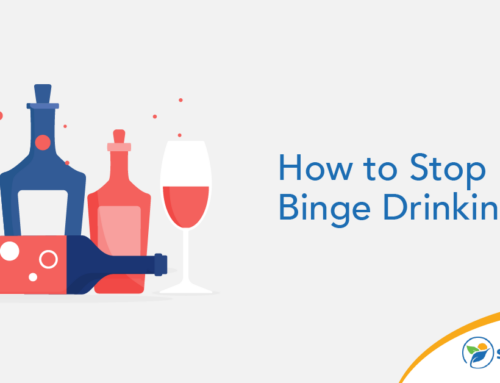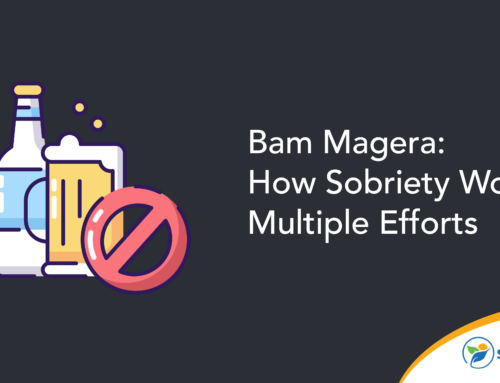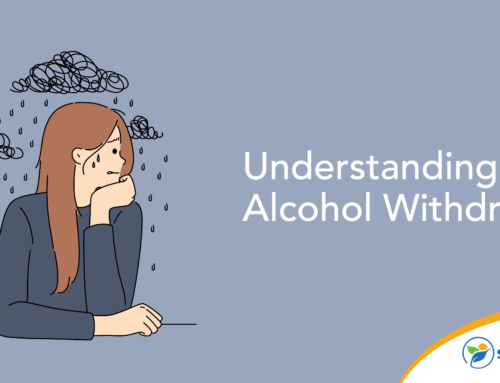Alcoholism is a disease that affects a person’s life in all areas, from their workplace performance to their personal relationships. If someone in your life is struggling with alcohol addiction, you may be wondering what steps you can take to support them in getting professional treatment. What is an alcoholic, and how can you confront them about seeking help for their addiction? Here’s what you need to know.
When Does Alcohol Use Become a Problem?
Alcohol is a common substance that’s consumed recreationally by people across the United States. A poll conducted from 2021 to 2022 found that 63% of U.S. adults aged 21 and older report drinking alcohol. While consuming alcohol is common and poses minimal risks when enjoyed responsibly, there is the danger of developing a dependence on alcohol, which can have destructive consequences.
Alcohol use becomes alcohol abuse when someone is consuming too much alcohol too often. Many health care providers consider consuming over three drinks in a day or several drinks per week to be crossing the line into excessive drinking.
Heavy drinking for people designated male at birth is considered over 14 drinks a week; for those designated female, the cap is more than seven drinks per week. When a person abuses alcohol and is unable to stop doing so, they’re considered addicted to the substance.
What Is an Alcoholic?
An alcoholic is someone who has a strong and uncontrollable need to consume alcohol. When a person becomes dependent on alcohol consumption to function without symptoms of withdrawal, they can be considered an alcoholic.
This chronic disease, known as alcoholism or alcohol use disorder (AUD), is diagnosed on a spectrum of mild, moderate or severe, depending on its effect on an individual’s personal life. Behaviors may include:
- Being unable to limit, stop or control their drinking
- Experiencing withdrawal symptoms if they try to stop drinking
- Continuing to drink despite it causing conflict with loved ones
- Becoming sick from their drinking
- Engaging in risky behaviors while under the influence of alcohol
If someone exhibits these behaviors, they may be living with AUD.
Should You Confront an Alcoholic?
Once you realize a loved one in your life might be an alcoholic, you may be wondering how to help someone with addiction. It can be tempting to simply confront the person about the issue, but there are several things you should never say to an addict that can make the situation worse and ultimately push them away.
To position yourself as a support system and encourage the person to seek help of their own accord, you must take a tactful approach to discussing their addiction. You may contemplate waiting for them to come to you, but if the person’s behavior is endangering themselves or others, you may not have the time to wait for them to realize on their own.
How to Help Someone Who Is an Alcoholic
If you’re faced with the challenging task of talking to someone in your life about their alcohol use disorder, there are several steps to take to ensure you’re not blaming or verbally attacking them. The goal is to present yourself as a supportive and caring presence in their lives rather than someone passing judgment. This approach reduces the likelihood of a defensive reaction that will only push you further away from your loved one.
Here are the steps you can take when approaching your loved one about their alcoholism.
Prepare What You Will Say
Don’t go into the conversation spontaneously or with no idea of what you’re going to say. This may be your only opportunity to open the floor for discussion, so you want to get it right.
Be intentional about the words and tone you use. Avoid making accusations, judgments or assumptions about their behavior and lived experience. Think about the message you want to convey and how to do so gently before initiating the talk.
Have an Action Plan
In addition to thinking about what you’re going to say, have a plan of action for how to proceed once the discussion plays out. If you’re hoping to encourage the person to seek professional treatment, do you have a treatment center in mind that you can take them to if they ask? Can you drive them home and stay with them if they ask you for further support?
Think about the possible outcomes of the conversation, and be prepared to follow through with them beyond verbal discussion.
Choose the Right Time and Place
The timing of the conversation directly affects its outcome. Choose a setting and time to approach your loved one when they are calm and coherent. A comfortable and private setting like their home or yours limits interruptions and distractions. It also gives you both space to be emotionally honest and vulnerable.
If there’s tension in your relationship, don’t start the discussion during an argument or fraught moment. Wait until everyone has settled down and is thinking rationally.
Listen to What They Have to Say
A conversation is a two-way street, so you must remain open and receptive to what they have to say in response to your planned dialogue. Don’t cut them off or talk over them just to get your point across. Demonstrating that you care about their experience and perspective shows you’re willing to support them through this.
Support But Do Not Enable
There’s a difference between supporting and enabling someone with alcoholism. If your loved one chooses not to get help after your discussion, you can still be supportive without encouraging them to continue drinking or remaining silent about their actions.
Dismissing their behavior or absolving them of consequences because it’s a disease enables them to continue on the same path. Make your position on the matter clear and communicate that you’re always there to talk when they’re ready to get help.
Professional Help Is Available
You don’t have to figure out how to help an alcoholic in your life alone. At Sunlight Recovery, our team of professionals is here to support you and your loved one on the journey to sobriety. With group therapy, medical detox, medication-assisted treatment and outpatient care options, we can curate a treatment plan that meets your needs. Contact us today for more information and support.







